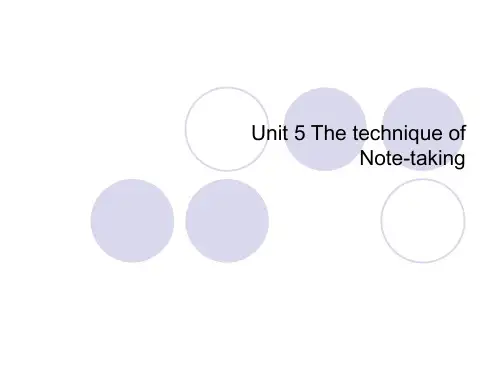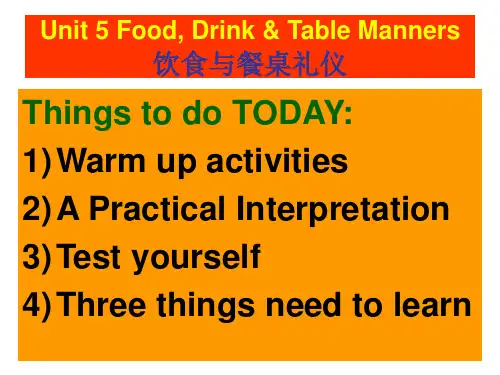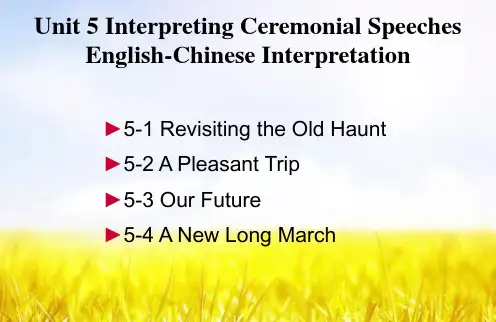大学英语专业口译课程 第5课 session5
- 格式:ppt
- 大小:3.64 MB
- 文档页数:24


大学英语精读第3册第5课课文翻译及课后答案课文翻译妈妈哭的那天很久前一个阴暗的冬天,我放学回家,心中充满着期待。
我腋下夹着一本我所喜爱的刚出版的体育杂志,而且整个房子将只有我一个人。
爸爸还没下班,妹妹不在家,妈妈刚找到一份新工作,在一小时内是不会回家的,我跳上台阶,冲进起居室,啪的一声打开电灯。
我眼前出现的景象使我惊呆了。
妈妈紧缩着身子。
手捂着脸,坐在沙发的一端,她在哭。
我以前从没见她哭过。
我小心地走近她,把手放在她肩上。
“妈”我说,“怎么了?”妈妈长叹一口气,强作微笑。
“没什么,真的。
没什么大不了的事。
只是我要失去这份新工作了。
我字打的不够快。
”“但你才上三天班,”我说,“你会赶上的。
”我重复了妈妈对我说过的一百遍的那句话。
每当我学什么或做什么重要事情而遇到麻烦时,妈常这样对我说。
“不行了,”妈妈神色黯淡地对我说。
“过去我常说只要我下决心,什么事我都能干好。
现在我仍然认为在多数情况下我能做到。
但是,打字这事我做不到啦。
”我无能为力,十分尴尬。
那时我16岁,仍然认为妈妈能做任何事。
几年前,当我们卖掉农场,搬到城里来住的时候,妈妈决定开一所日托所。
她没受过这方面的训练,但这并不妨碍她。
她参加幼托函授课学习,做练习,六个月后就正式获得从事这项工作的资格了。
不久后,她不但招满了生,而且还有许多孩子等着注册。
我认为这是理所当然的,是妈妈能力的体现。
但是不管是日托所还是后来爸妈买的汽车旅馆都无法提供足够的钱送我和妹妹上大学。
两年后我就要准备上大学了。
再过三年,妹妹也想上大学。
时间过得真快。
妈妈想尽了一切方法存钱。
很明显,爸爸不可能比他现在干得更多---除了一份全日制工作外,还要耕种80英亩地。
在我们卖掉汽车旅馆几个月后,妈弄回家一台旧式打字机。
这台打字机跳字,键盘也很松。
那天吃饭时,我说这台打字是“废物一件”。
“我们只买得起这个,”妈妈说。
“这对练打字是够好的了。
”从那天开始,只要桌子一收拾,碗一洗,妈妈就会消失到她的缝纫房里练习打字。




Unit Five 礼仪性口译(英译汉)Interpreting ceremonial speeches English-Chinese Interpretation 5-1故地重游Revisiting the Old HauntLadies and gentlemen,女士们、先生们:Permit me first to thank you, our Chinese hosts, for your extraordinary arrangements and hospitality. My wife and I, as well as our entire party, are deeply grateful.首先,请允许我感谢中国主人的精心安排与好客。
我与我夫人以及我团的全体随行人员都深为感激。
In the short period of six days, we have gone a longer distance than the world-renowned “Long March”. We have acquired a keen sense of the diversity, dynamism, and progress of China under your policies of reform and opening to the outside world.在短暂的6天里,我们的行程超过了举世闻名的“长征”。
在改革开放政策引导下的中国,气象万千,充满活力,不断进步,这些我们都已强烈地感受到了。
My wife and I have a special regard and personal friendship for the people of China. Beijing is for us and old and nostalgic memorable time with the people here—working, shopping, sightseeing, and touring the city on our bicycles. During that time we never experienced anything other than the utmost courtesy and genuine friendship of the Chinese people.我与我夫人对中国人民怀有一种特殊的敬慕之情和个人友谊。



Unit 5 Urban pulseListening to the worldSharingScriptsH = Hina; M1 = Man 1, etc.; W1 = Woman 1, etc.Part 1H: I’ve always enjoyed living in cities. I like the mix of people and all the different things that you can do. Not everyone feels like me, though. Some people prefer the peace and quiet of the country. How about you? Do you enjoy city life?Part 2M1: No, absolutely hate London. Much prefer the country.W1: Yes, I love city life. Um, I mean, London’s such a vibrant, um, active city. Um, there’s (there’re) always lots of things to do.W2: Where I live is very, very central and it’s inner city. So it’s what I’m used to and I enjoy thatI can get everywhere really easily.W3: I enjoy it. It’s um – it suits me. I think it suits my personality.W4: I really enjoy living in London. Um, it’s a great place to be. There’s (there’re) lots of people around, lots of things happening. Where I live, there’s (there’re) lots of art shows, and … and photographers.M2: I do like city life. I think er, London especially is very vibrant, and there’s always something going on.Part 3H: What are the good things about living in a city?W1: London is such a large city. Um, you know, you can never tire of it, really.W4: I think there’s always something to do. Um, always something to go and see. And lots of events and culture, and um, you can never be bored.M1: Obviously culture. I mean … I live right next door to the Globe Theater, the Tate Modern so um, theater is terrific. Er, huge choice of restaurants, of course.W3: The good things about living in the city is er, the tube, which is … is really amazing. It’s cheap and it’s really frequent.M2: Um, I think transport is one of the best things. The fact that you can live, probably miles away from your friends – and you can all sort of, get to the same place fairly easily, and fairly quickly.W2: You’re so central. Everywhere’s close at hand, um, there’s (there’re) always lots of people around so, you feel quite safe.Part 4H: What are the main problems in cities?M1: Traffic is horribly congested.W1: Sometimes it can be difficult to get round the city quickly, um, and that can be frustrating.W4: I think there’s … there’s always a very much of a go-go kind of attitude – that you have to be on the go the whole time. And there isn’t the time just to chill out or take time out. And if you’re not doing something, you’re missing out.W3: The main problems I’d say, are probably crime, and just not feeling safe.W2: I think the crime. I think that the crime’s a huge problem in city life.M2: I think we should be trying to encourage um, more sort of green transport so, cycling, um, and encouraging people to walk, and use their cars less.W3: I think there’s not much that you really can do about crime. Because I think it’s a social issue.So if people are – you have to, kind of, address why people are committing crimes before you can do anything about it.W4: I think a city’s a city. You either wanna live in a city or you wanna live in the countryside, or by the sea. And I think it’s your choice.ListeningScriptsConversation 1I = Interviewer; R = RickI: Rick, you’ve lived in Dubai for … what, four years, right?R: Yeah, four years.I: So what’s it like, living in Dubai?R: Well, I read that Dubai is one of the world’s fastest growing cities, so there are a lot of people, and it’s very crowded. It’s a great city for shopping, and going out. And it has a really good nightlife, with lots of bars and clubs.I: Is it a safe city?R: Yes, there isn’t a lot of crime. The streets are very safe. But one of the biggest problems is the traffic. Everyone drives a car here – petrol is still cheap, so the traffic’s terrible. One good thing is the taxis though. There are lots of them, and they’re cheap, so you don’t have to drive.Conversation 2I = Interviewer; S = SashaI: Sasha, you live in Tokyo, don’t you?S: That’s right.I: And, do you … do you like it? Do you like living in Tokyo?S: Yeah, Tokyo is a great city to live in. People think it’s very expensive, but actually you can buy Japanese food in the supermarkets quite cheaply, and eating out in Japanese restaurants isn’t expensive either.I: How about getting around? What’s the public transport like?S: There’s a really good public transport system here. The metro system is fantastic. It’s very fast, and it’s cheap, so lots of people use it. That’s the only problem. It gets very crowded.I: And what do you like best about living in Tokyo?S: Ah, the food, definitely. I love Japanese food! And the green spaces. There are lots of parksand green spaces, so it’s less polluted than you think.Conversation 3I = Interviewer; C = CharlieI: What about Sydney? What’s Sydney like, Charlie?C: Sydney is one of the best cities in the world. There are lots of young, friendly people living here, so there’s a really good atmosphere. The streets are clean and safe and there are lots of things to see and do. There are beautiful buildings, like the Opera House. You can sit and watch the boats on the harbor. And it has one of the most beautiful coastlines in the world.I: What’s the weather like? Is it really hot?C: The weather is perfect. It’s never too hot and never too cold. You can eat outside all year round, so there’s a great café culture with lots of places on the streets selling really good coffee.I: So, are there any problems?C: Problems? Not really. Traffic, I suppose. Too much traffic and a terrible public transport system.ViewingScriptsP&F = Phillip Scholfield and Fern Britton; JL = Jay Leno; GN = Graham Norton;TS = Tim Samuels; G = George Clooney; J = Joan; W = Winnie; A = AlfP&F: The Zimmers! Hurray!JL: The Zimmers!GN: The Zimmers!TS: Who’d have thought it would come to this? When 40 isolated old people formed a rock band. This is the story of how The Zimmers, with a combined age of nearly 3,000 took the rock world by storm. And even took their message all the way to Hollywood.G: Congratulations, you guys. Hello. Hi, I’m George. How are you? I hear you’re all over the charts.TS: Four months ago, we set about making a film about what it’s like being old in Britain today.We found many who were lonely and forgotten, cast aside by society.J: Hello.TS: Hello, Joan. I’m Tim. Eighty-two-year-old Joan had been stuck indoors since a bad fall three years ago.J: When I have left the flat, it’s only ever for something like that, the doctor’s, the dentist …you know, not … I haven’t been for pleasure.TS: Nighty-nine-year-old Winnie was a serial care-home mover. She just couldn’t find one that felt right. Over the last decade, she’d moved care homes 16 times. Boredom drove Winnie from her last home. How do you feel about leaving this place?W: Nothing but joy.TS: And 90-year-old Alf was facing the closure of his local bingo club, which meant there would be nowhere to meet his friends.A: I’m gonna lose these people, when that closes, it’s because I’ve gotta, I’ve gotta find new friends. And at our ages, it’s so difficult.TS: So, we thought we would try and get these cast-aside old people heard again. And what better way than record a charity single, and try and storm the charts. All we had to do was convince them we were serious. Eventually, 40 pensioners took a leap of faith and came together at the world-famous Abbey Road Studios, to record a cover version of The Who’s “My Generation”. The name of their band, The Zimmers.TS: It was a day when people made friends, and came alive again.W: I’ve never kissed a 101-year-old yet.TS: What’s more, it looked like we might even have a decent single on our hands. And when we made the video available online, it proved a sensation. Two million people watched it in the first few days.Speaking for communicationRole-playScriptsConversation 1G = Guest; R = ReceptionistG: Oh hello. Er, could you help me? There’s a problem with the air conditioning.R: Oh yes?G: I’ve just tried to switch it on, but it doesn’t work.R: Is it completely dead?G: Completely. Absolutely nothing.R: OK, we’ll look into it right away. I’ll send someone up. It’ll be about five minutes, OK?G: Thanks.R: You’re welcome. And sorry about that.Conversation 2W = Waitress; D = Diner; M = ManagerD: I’m afraid I have a complaint. Could I speak to the manager, please?W: Oh, yes, of course.M: Good evening, sir. I understand there’s a problem.D: Yes. I’m afraid I have a complaint.M: Oh?D: Well, we got here at eight. And then we waited about 20 minutes for a table.M: Right.D: This is for a table we’d booked for eight, OK? Then we waited another hour for our meal.M: Right.D: One hour. Then when the bill arrived they put this extra charge on it.M: An extra charge? That’s probably the service charge.D: Well, could you check this for me, please?M: Yes, that’s service.D: Well, to be honest, I don’t want to pay this.M: Of course not. Well, sir, I am really sorry about that. It’s a very busy time of year.Conversation 3(The Eight Thirty-two to Cambridge has been delayed. We apologize for any inconvenience caused.)W = Woman; M = ManW: Excuse me. Do you work here?M: Yes.W: Do you know when the next train will be arriving? I mean, I’ve been here for over an hour. M: I’m sorry but there’s nothing we can do at the moment. Everything is delayed.W: And you don’t know when the next train is coming?M: No.W: Or why there’s a delay?M: Snow.W: What?M: Snow on the track. It was the wrong type of snow.W: What do you mean “the wrong type of snow”? You’re kidding, right?Further practice in listeningShort conversationScriptsConversation 1W: I love the modern conveniences and efficient public transportation the big city offers, and above all, much greater access to a variety of entertainment.M: The greatest advantage of living in a large city is that I can eat a huge variety of food from different cultures.Q: What attracts the woman most in a big city?Conversation 2M: There seems to be nowhere to park outdoors. Shall we try underground parking?W: Underground parking is always a nightmare for inexperienced drivers like me. More than once my car has been scratched on the side when driving down the narrow slopes.Q: What do we know from what the woman said?Conversation 3M: Many people think that big cities such as London and New York would be wonderful places to live in.W: The problem is that as too many individuals think that way and move into these cities, the resulting crowdedness and high house prices undermine their attractions.Q: What does the woman imply?Conversation 4W: The number of citizens above the age of 60 will increase from the current 147 million to 174 million this year, representing about one-eighth of the total population.M: The aging problem has not only come earlier than anticipated but also come about rapidly. Q: What does the man say about the aging problem?Conversation 5M: I live in New York, and for me, there’s nothing that compares to its culture, energy and convenience.W: But I also know that people living in big cities tend to be under greater pressure and have a greater risk of mental disorders.Q: What does the woman think about the people living in big cities?Long conversationScriptsM: Hi Emily! Something troubling you?W: Not sleeping well. My husband’s got a new job in Santa Fe, New Mexico! I’m a girl born and raised in big cities. I’m a little worried …M: What about?W: Well, my hometown has about 4.5 million people! You know how many people live in Santa Fe?M: Not exactly, but, listen!W: Well, I looked up the population and it’s like 70,000! Tiny! It really is a great job for John – my husband, but in a small town! I’m sure there will be no good restaurants, or nice places to walk, no nightlife …M: Whoa! Wait a minute Emily! Did you do anything besides looking at the population of Santa Fe?W: Uh, no …M: You’re jumping to conclusions – and they’re all wrong! I’m from Santa Fe! It does have a small population – but it’s an amazing place! The history and architecture are unique.The city center was built in the 1600s by the Spanish. It’s full of beautiful shops, restaurants, coffee shops, and art galleries. It has amazing nightlife – full of wonderful people. That’s why famous writers and movie stars love Santa Fe, too!W: Wow, sounds great … What about outdoor life?M: It’s wonderful! The colors of the sky and mountains are so beautiful that artists come from around the world to paint! And the sky at night is so full of stars that you feel like you can reach out and touch them. It’s a magical place, Emily. Soon you’ll realize how lucky you are.You’ll have a long line of family and friends waiting to come and visit you in Santa Fe!Passage 1ScriptsLiving in the city is hard enough for a single person, but if you have kids life can get morecomplex. Finding ways to keep the little ones occupied can be a full-time job. So it should be no surprise that parents will go to great lengths to get a little peace and quiet.However, when I first got to know that some parents bought their young children – not teenagers – iPads, I was shocked. Who spends $500 on an iPad for a young child when so many adults in the United States go without or have limited access to computers and the Internet? Whatever happened to Lego, building blocks and colored pencils? And for those slightly older kids how about a good, old-fashioned book instead of an iPad for the car journey to the beach?Recently, I was at dinner with a couple and I brought up the subject of parents buying iPads for their young children. I was curious to see how they responded since I knew they had three young kids. It turned out they are a part of this growing trend. The iPad can download or stream cartoons, so it makes for excellent entertainment when they’re trying to get to the grocery store or head out of the city for the annual family vacation. But the best thing about iPads is that there are games and educational applications for nearly every age level.It got me thinking that maybe my first reaction was a little too “reactionary”. Now I can understand the parents a little better. If I had three kids and was living in the city they would probably have an iPad, too.Q1: What shocked the speaker?Q2: What is appropriate for slightly older kids according to the speaker?Q3: What is the best thing about iPads according to the couple?Q4: What does the speaker think of buying iPads for kids after talking with the couple?Passage 2Scripts and answersAround the world smart cities are being built while those we have lived in for centuries are being upgraded for the future. A smart city may mean one that uses data on traffic to ease congestion or one that aims to 1) join up services to provide better information for citizens. For many it is about making cities greener and more efficient. It is partly a 2) reaction to overcrowding and pollution and partly because in an ever-connected world it 3) makes increasing sense to hook entire cities up to the network.Masdar is a city that stands in the middle of the desert of Abu Dhabi in the United Arab Emirates. It is designed to be one of the most 4) sustainable cities on the planet. With a solar power station at its heart and wind farms providing energy for it, it 5) aims to be carbon free. Everything in the city, from water to rubbish, is measured and 6) monitored, becoming a source of information. The city is built on a raised platform to allow its “digital plumbers” easy 7) access to the system of advanced technologies that run it. It is pedestrian-friendly and entirely car free. The city is 8) experimenting with a network of electric driverless podcars. The PRT – personal rapid transit – will run six meters under street level across the city. The buildings in the city have been designed by Norman Foster’s architecture firm, which designed a number of 9) eye-catching buildings including The City Hall in London.It is hoped that 40,000 people will eventually live in the city, with up to 50,000 10) commuting there each day.。


Unit 6 课外练习Passage Four P1841、New Zealand is a South Pacific country located midway between the Equator and the South Pole. Lying within the South Temperate Zone, New Zealand has an oceanic climate, without extremes of heat or cold. Most parts of the country enjoy ample sunshine and rainfall, although the weather is rather changeable. Seasons are the reverse of the Northern Hemisphere, with temperatures generally higher in the north of the country, which experiences sub-tropical warmth in summer. Winter brings extensive snowfalls in the Southern Alps.新西兰是一个南太平洋国家,位于赤道和南极洲之间。
新西兰地处南温带,属海洋性气候,没有严冬和酷暑。
尽管气候变化较大,但全国大部分地区阳光充足,雨量充沛。
新西兰的季节与北半球相反,北部的气温一般较高,夏季有着亚热带地区的温暖。
冬季到来时,南阿尔卑斯山脉为大雪所覆盖。
2、There are now over 3,300,000 New Zealanders of all races, predominantly of European and Polynesian origin. The Maori population is around 12% of the total. As the result of intermarriage, many New Zealanders have both Maori and European ancestors. This country has a low population density, with about 12 people in every square kilometer. More than two-thirds of New Zealanders live in the North Island and three quarters of the people live in cities and towns along the coastal areas and lowland plains.新西兰所有种族的总人口现已超过330万,主要是欧洲人和波利尼西亚人的后裔。
Lesson 11.3 美国副总统复旦演讲韩市长,非常感谢您!谢谢您做介绍时的友好言辞。
今天我们很高兴来到这里。
我和我夫人为有这次机会再次来到中国访问感到荣幸。
感谢贵国对我们的欢迎,特别感谢复旦大学的热情接待。
我们为此感到不胜荣幸,谢谢你们!我们此行带来了布什总统和美国人民的良好祝愿。
我知道在座的许多人很快就要从这所优秀的大学毕业。
我听说贵校有极为严格的标准,得到复旦大学的学位代表着多年的刻苦攻读和自我约束。
我祝贺在座各位学业有成。
对各位老师坚持复旦大学99年追求卓越的传统我深表钦佩。
1.4 Speech by Wang Guangya at Princeton UniversityLadies and Gentlemen,Good evening.I am honored to be invited to your seminar tonight. For me, for my colleagues and for many other Chinese, Princeton has long been a familiar name. With a history longer than the country, it has produced many outstanding people, Woodrow Wilson, the 28th US president, Albert Einstein, the great scientist, and T. S. Eliot, the famous poet, to name but a few. As former president Bill Clinton said in 1996 at the celebrations for the 250th anniversary of Princeton,“At every pivotal moment in American history, Princeton, its leadership, faculty and its students have played a crucial role.”I am more pleased to learn that all of you have a keen interest in China. Though our two countries are geographically far apart, we have a great deal in common in the everyday life. While many Chinese enjoy Hollywood movies and McDonald’s fast food, many Americans find that their clothes and daily necessities are made in China. I hope that toda y’s seminar will help you gain a better understanding of China and its foreign policy, thus deepening further our friendship and cooperation.1.5 新工厂落成典礼上的讲话各位尊敬的来宾,女士们,先生们:下午好!欢迎大家前来参加我们公司在中国的首家新厂房的落成典礼!感谢各位拨冗光临,与我们共同庆祝这一盛大的活动!我谨代表公司对今天来参加典礼的各位供应商、客户嘉宾、各位员工和业务伙伴说声“谢谢!”公司管理层深深为我们的新工厂感到骄傲,我们能干的员工感到骄傲,他们发展了工厂的业务,使之达到国际水平。
Module 5 Public speakingI Theory and skills演讲的技巧(一)口头表述一名优秀的译员必须同时是一位杰出的演讲者。
译员作为次级讲话人(secondary speaker),与发言人同时出现在听众面前,必须要将发言人的发言效果(impact)体现出来,这不仅仅指语言内容要准确,也指译员要合理运用声音、姿势、动作、眼神等。
出色的译员能通过良好的演讲表现增加听众对其翻译能力和译作质量的信任度。
但是,译员与一般演讲者有所不同。
译员对于发言的题目、内容和发言目的没有决定权,也不能随意更改发言内容,只能通过翻译尽量达到讲者要传达的发言效果。
因此,口译训练中的演讲技巧注重表述能力,它包含口头表述(vocal rendering)和体态语言(body language) 两个方面,指的是译员借助有声和无声的手段达到良好的演讲效果的能力。
表述训练是为了增强听众对译员的信任度,提高译文的效果。
译员的口头表述的训练重点是发声(voice projection)和吐字(articulation)。
在发声训练上要注意音色、音高、音量、语调、语速、停顿和变化这几个要素。
吐字强调的是口齿清楚、发音准确。
吐字的技巧不仅关系到音节的清晰度,而且关系到声音的圆润、饱满。
要吐字清楚,首先要熟练地掌握常用词语的标准音。
其次,要力求克服发音含糊、吐字不清的毛病。
平时多练习绕口令有助于练好吐字的基本功。
另外,由于译员工作时大多通过麦克风传递声音,因此要注意“麦克风礼仪”(microphone manners)。
译员的嘴巴应与麦克风之间保持一定的距离以把握适当的音量,防止音效失真和出现气爆杂音(pop noise),要注意不能对着麦克风喘粗气、吸鼻子、咳嗽或大声翻阅资料。
演讲的技巧(二)体态语体态语又称身势语或形体语言,是人们利用姿态、动作、面部表情来传递信息的非言语行为。
体态语是人类社会交际的信息载体。